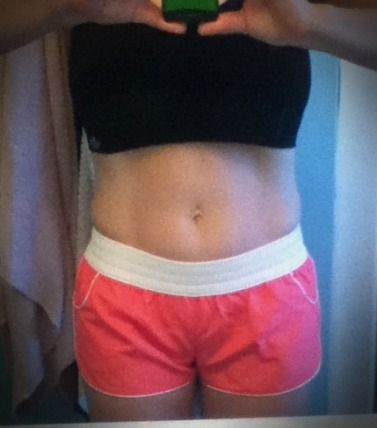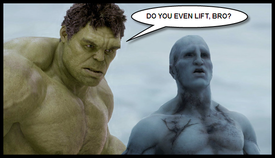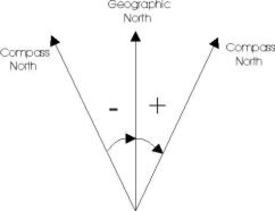BMI - how much do you depend on your BMI #
Replies
-
BMI is crap, get some calipers to be most accurate. My BMI considers me obese, but I actually am at 12% BF and fairly muscular.
calipers are no more accurate than online calculators. most BF% measuring tools are unreliable, but you can give yourself a decent idea by always using the same method and comparing.
Correct. Immersion bath and displacement is the best method of determining bf%. Good luck with that. It's costly and hard to find someone willing to do it for you.0 -
Totally hear you and respect where you're coming from - my argument has been this: even people with large amounts of lean muscle mass can be at higher risk for disease BECAUSE of that. this is what BMI projects - risk of illness - and a body builder with 2% body fat can absolutely have the same risk of disease as someone with 30% body fat if they fall into the same range on the BMI scale. Disease isn't caused by fat - it's caused by the heart (or other organs) having to WORK HARDER for longer periods of time than they should to keep you system operating. And my hypothesis is that BMI is an excellent prognosticator on that front. The bigger you are, the harder it has to work, the more risk there is for complications.
keep in mind, I don't know that I'm right about this, it just makes sense when you put the pieces together.
Who lives the longest? Trim, fit people like Japanese, Okinawans, etc who are neither fat NOR ripped
Not quite accurate. But at least you said you dind't know if you were right.0 -
My BMI at 5'2" is 25.29 putting me at 'overweight'. I wear a size 0-4 jeans depending on the brand.
My picture from this morning-
Do you think the BMI is a good indication of a healthy weight? I know I have a muffin - top I'm working on it, but what do you think about the standards for the BMI?
BMI is one of the worst POS tools for figuring out fitness and obesity. there are so many factors that aren't considered.
Such as?
As if they need to be restated here, lean body mass, implants, bone structure, RHR, pulmonary function, etc.0 -
I don't care about BMI too much...it's a reasonable starting point for setting goals, but it's not the most accurate thing in the world. According to BMI, I'm still overweight by quit a bit...according to my BF% I'm just at the high end of healthy and "average" for my stats. I had quite a bit of muscle on me as I am a former athlete and former Marine...I just happened to add a good layer of fat over time as well. All I care about is my BF%...it's the only thing that really matters.0
-
BMI constantly gets argued about on this site. No one is ever going to agree. Use BMI as a tool not as your only measure of health. OP you look amazing! Keep up the good work.0
-
Another point I would like to share: In the Navy, as part of a collateral duty, I was our station's "Fat Boy Coordinator." This meant I was in charge of running our regular PT tests, and measuring and weighing in every person assigned to the station. We did not use BMI. we used the military bf% that I sent a link to earlier. If someone was over 22%, I had to do daily couselings and go over health teaching, on healthy eating, portion control, exercise, etc. If they were >26%, I had to send them to a doctor where they would be evaluated using a more accurate bf% measurement. Many of the guys who had this came back with a MD note saying they were healthy and not obese, and their measurements were to be taken by the sick call from then on. These were generally the body builders, but there were others.0
-
I wouldn't rely on it. It doesn't consider muscle. Plus my BMI is like 18.3, which puts me at "slightly underweight" when I know I'm not underweight.0
-
My BMI at 5'2" is 25.29 putting me at 'overweight'. I wear a size 0-4 jeans depending on the brand.
My picture from this morning-
Do you think the BMI is a good indication of a healthy weight? I know I have a muffin - top I'm working on it, but what do you think about the standards for the BMI?
BMI is one of the worst POS tools for figuring out fitness and obesity. there are so many factors that aren't considered.
Such as?
As if they need to be restated here, lean body mass, implants, bone structure, RHR, pulmonary function, etc.
Also doesn't work so well for my friend who's a bilateral amputee... Especially since she can pick whatever height she wants to be.0 -
It is a good indicator but would not give a perfect picture on the actual lean muscle mass you have. But still it give u something to work on..0
-
NONE ......BF% is all I care about really0
-
I think the funniest part of this thread are the responses calling BMI useless, but following it up with "my pants size is..."
because THAT is certainly an indicator of healthy weight. :laugh:0 -
I think the funniest part of this thread are the responses calling BMI useless, but following it up with "my pants size is..."
because THAT is certainly an indicator of healthy weight. :laugh:
It directly correlates to waist size which actually is in indication of health. So -- not sure why that is hilarious, but um yeah. Yes, sizes vary -- but if you are a size 10 US your waist is likely 27-29.0 -
I think the funniest part of this thread are the responses calling BMI useless, but following it up with "my pants size is..."
because THAT is certainly an indicator of healthy weight. :laugh:
It directly correlates to waist size which actually is in indication of health. So -- not sure why that is hilarious, but um yeah. Yes, sizes vary -- but if you are a size 10 US your waist is likely 27-29.
Vanity sizing. There is very little consistency in sizes between manufacturers in the US.
It's the same argument that many have used to discredit BMI - they don't "look" overweight. Perception clouds reality.0 -
I think the funniest part of this thread are the responses calling BMI useless, but following it up with "my pants size is..."
because THAT is certainly an indicator of healthy weight. :laugh:
It directly correlates to waist size which actually is in indication of health. So -- not sure why that is hilarious, but um yeah. Yes, sizes vary -- but if you are a size 10 US your waist is likely 27-29.
Because you need to consider your waist to height ratio. Pants size means nothing. A 10 on a tall person is going to be someone with a much different ratio than a short person. Clothes sizing is not a measurement of fitness, health or bf% especially since sizes vary so much. I have clothes that range from size 2 to 10 and they all fit although I do like your US sizes because I can wear a much smaller number in your generous sizing.0 -
BMI is a joke! Im 6"1, 230 lbs and im considered obese.0
-
agree with everybody else, BMI is crap, i'm obese by those standards just because i carry a lot of muscle. Don't pay attention to that, i just go by how i look in the mirror and how i feel about myself0
-
I agree too, but.............and this is a big but................... our health insurance company goes by BMI for one of our 5 tests for being within the healthy range for our insurance. If we do not fall within the guidelines in all the categories, we will have to pay more for our insurance. Weight is the main reason I began here in March of 2012, I fortunately am good in all the other areas. We have until December of 2013 when we will be re-evaluated to meet the requirements. So I depend on BMI quite a bit. Isn't fair, but life sometimes isn't, and this is one of those times it isn't fair for me.0
-
Not much. I don't have a ton of muscle but I still have a good amount in my legs from 7 years of marching band (you'd be surprised at the workout you get from marching 4 hours a day with a xylophone on your shoulders) and walking everywhere for ages (I lived in a small town most of my life and could walk to work, the store, etc. I didn't even get my license until I was 20 years old.) It doesn't take that into account.
Still, I mentally high-fived myself this last week when I hit the "normal/healthy weight" category for my height. A lot of doctors go off of BMI and, as sad as it is, they take your problems more seriously when you're not overweight anymore (for a while my knee pain was "due to my weight." Recently they took time to figure out that it's a kneecap cartilage problem from being knock-kneed and made worse from the years of marching, etc. PFPS I think it is.)0 -
you shouldn't go by bmi, it does not account for any muscle you have gained. my husband is a personal trainer and he is 255, solid muscle and according to bmi he is overweight.
go by body fat, or just go by your clothes, are they bigger, do you feel smaller, check your face and collar bones, take measurement
the bmi can really discourage you especially when it says your overweigh and your gaining muscle
I actullay know a girl, who was 125 when she started working out, went up to 136, but it was all muscle, cut abs and toned arms, awesome legs.
good luck0 -
agree with everybody else, BMI is crap, i'm obese by those standards just because i carry a lot of muscle. Don't pay attention to that, i just go by how i look in the mirror and how i feel about myself
What does how you feel about yourself have to do with whether or not your are overweight?0 -
I think the funniest part of this thread are the responses calling BMI useless, but following it up with "my pants size is..."
because THAT is certainly an indicator of healthy weight. :laugh:
It directly correlates to waist size which actually is in indication of health. So -- not sure why that is hilarious, but um yeah. Yes, sizes vary -- but if you are a size 10 US your waist is likely 27-29.
Because you need to consider your waist to height ratio. Pants size means nothing. A 10 on a tall person is going to be someone with a much different ratio than a short person. Clothes sizing is not a measurement of fitness, health or bf% especially since sizes vary so much. I have clothes that range from size 2 to 10 and they all fit although I do like your US sizes because I can wear a much smaller number in your generous sizing.
Yeah, but generally speaking, if somebody is throwing out a number US 12 (29-30 waist) and under, the likelihood is they wouldn't be considered overweight by that W/H ratio. Unless, of course they are under 5'0 or over 6'0. It's kind of nitpicky since most women are 5 foot something or other.0 -
I don't pay any attention to BMI. It has nothing to do with anything that is relevant to me.0
-
BMI is pretty accurate for an average person. The range for a particular height takes into account different frame sizes. You would know if you aren't average --- aka you are carrying a significantly higher or lower amount of muscle mass than the average person of your height. If you have a lot of muscle from lifting weights or being very athletic, then a higher than "normal" BMI may be fine. If you have a lower than average muscle mass from illness, poor diet, or ED, you may be at a lower than "normal" BMI but still appear "fat".0
-
agree with everybody else, BMI is crap, i'm obese by those standards just because i carry a lot of muscle. Don't pay attention to that, i just go by how i look in the mirror and how i feel about myself
What does how you feel about yourself have to do with whether or not your are overweight?
Boom. :drinker:0 -
I think I'm going to have to state the facts about BMI since I am a Registered Dietitian and Nutritionist. The DEFINITION of Body mass index (BMI) is a measure of BODY FAT based on height and weight that applies to adult men and women. While it does have its limitations, it is a useful tools to measure underweight, healthy weight, Overweight or obese status in individuals who are not bodybuilders or athletes.
That being said, BMI also does not differentiate between body fat and muscle mass. This may often result in misleading information with regard to the amount of fat in an individual. There is a potential risk of overestimating ‘fatness’ in individuals with high muscle mass, such as body-builders, and underestimating the fat deposit in those with less lean body mass, such as the elderly.
In Healthcare settings, BMI is used it is part of the Nutritional Assessment of a patient/resident and for Medical billing purposes in the United States. I am just stating the facts here, as I use it everyday at my job. If the Patient/Resident is determined to be either underweight, overweight or obese based on weight and height alone, I must code for that. There are no exceptions.
I am 5'1" and 102-103 lb = BMI of 19.3-19.5 (Healthy Weight), I workout 6 days per week and lift weights 3x per week, but not heavy and I'm not a body builder. Personally, I am more concerned about my body fat percentage and amount of lean body mass I have.
Therefore, while BMI can be a useful health tool in many individuals it is not a useful in Body Builders and Athletes, esp. in Males who lift heavy weights, they will almost always be labeled as Overweight or Obese. Again BMI does not differentiate between fat mass and muscle mass. Better indicators for fitness level would be Body Fat %, Waist Circumference and Waist to Hip Ratio. Also go by how you look in the mirror and how you fit in your clothes.
Great link below on the Limitations of BMI and Calculating BMI
http://www.medindia.net/patients/patientinfo/body-mass-index-limitations.htm
http://www.nhlbi.nih.gov/health/public/heart/obesity/lose_wt/risk.htm
Waist to Hip Ratio Calculator
http://www.bmi-calculator.net/waist-to-hip-ratio-calculator/0 -
I think I'm going to have to state the facts about BMI since I am a Registered Dietitian and Nutritionist. The DEFINITION of Body mass index (BMI) is a measure of BODY FAT based on height and weight that applies to adult men and women. While it does have its limitations, it is a useful tools to measure underweight, healthy weight, Overweight or obese status in individuals who are not bodybuilders or athletes.
That being said, BMI also does not differentiate between body fat and muscle mass. This may often result in misleading information with regard to the amount of fat in an individual. There is a potential risk of overestimating ‘fatness’ in individuals with high muscle mass, such as body-builders, and underestimating the fat deposit in those with less lean body mass, such as the elderly.
In Healthcare settings, BMI is used it is part of the Nutritional Assessment of a patient/resident and for Medical billing purposes in the United States. I am just stating the facts here, as I use it everyday at my job. If the Patient/Resident is determined to be either underweight, overweight or obese based on weight and height alone, I must code for that. There are no exceptions.
I am 5'1" and 102-103 lb = BMI of 19.3-19.5 (Healthy Weight), I workout 6 days per week and lift weights 3x per week, but not heavy and I'm not a body builder. Personally, I am more concerned about my body fat percentage and amount of lean body mass I have.
Therefore, while BMI can be a useful health tool in many individuals it is not a useful in Body Builders and Athletes, esp. in Males who lift heavy weights, they will almost always be labeled as Overweight or Obese. Again BMI does not differentiate between fat mass and muscle mass. Better indicators for fitness level would be Body Fat %, Waist Circumference and Waist to Hip Ratio. Also go by how you look in the mirror and how you fit in your clothes.
Great link below on the Limitations of BMI and Calculating BMI
http://www.medindia.net/patients/patientinfo/body-mass-index-limitations.htm
http://www.nhlbi.nih.gov/health/public/heart/obesity/lose_wt/risk.htm
Waist to Hip Ratio Calculator
http://www.bmi-calculator.net/waist-to-hip-ratio-calculator/
:flowerforyou:0 -
I don't "depend" on it. I'll be honest; was I excited to pass from the overweight range to the healthy range - yes. But I don't let it define me. I know perfectly well that I am not healthy and still need to lose more weight even though my BMI says I'm healthy, but still - if it is something motivating for me I'll take it any day.0
-
Entirely hypothetical: imagine if you will a woman. She's 5'6, 180lbs. Say in actuality, her bf% is ~35% or so. She's in her second week of lifting 3lb dumbbells on a program from a women's magazine. She's convinced her wee pump means she is developing huge muscles, and is kind of worried about moving up to 5lbs. She wears a size 12 American pant in some stores, a 14 in others. She's got an hourglass figure, likes her curves, and is the smallest in her social group. What are her perceptions likely to be? Say she's seeing a bicep line or something.0
-
I can see how everyone is saying that having lot's of lean muscle will throw off the BMI number. But I think for most of us who are overweight or obese lack lean muscle, which is the main problem. We have too much fat and not enough muscle. So for me, I feel the BMI scales are accurate. I am 5'6, 170 which makes my BMI 27 overweight. I feel this is very accurate. When I look in the mirror I see an overweight person but not an obese person. My goal weight is 150 which is what I have been my whole life. This makes my BMI 24. At 24 I look and feel fabulous! Not too skinny at all but just right. You on the other hand, seem to have a good deal of muscle. You could probably stay that way.0
-
I think I'm going to have to state the facts about BMI since I am a Registered Dietitian and Nutritionist. The DEFINITION of Body mass index (BMI) is a measure of BODY FAT based on height and weight that applies to adult men and women. While it does have its limitations, it is a useful tools to measure underweight, healthy weight, Overweight or obese status in individuals who are not bodybuilders or athletes.
That being said, BMI also does not differentiate between body fat and muscle mass. This may often result in misleading information with regard to the amount of fat in an individual. There is a potential risk of overestimating ‘fatness’ in individuals with high muscle mass, such as body-builders, and underestimating the fat deposit in those with less lean body mass, such as the elderly.
In Healthcare settings, BMI is used it is part of the Nutritional Assessment of a patient/resident and for Medical billing purposes in the United States. I am just stating the facts here, as I use it everyday at my job. If the Patient/Resident is determined to be either underweight, overweight or obese based on weight and height alone, I must code for that. There are no exceptions.
I am 5'1" and 102-103 lb = BMI of 19.3-19.5 (Healthy Weight), I workout 6 days per week and lift weights 3x per week, but not heavy and I'm not a body builder. Personally, I am more concerned about my body fat percentage and amount of lean body mass I have.
Therefore, while BMI can be a useful health tool in many individuals it is not a useful in Body Builders and Athletes, esp. in Males who lift heavy weights, they will almost always be labeled as Overweight or Obese. Again BMI does not differentiate between fat mass and muscle mass. Better indicators for fitness level would be Body Fat %, Waist Circumference and Waist to Hip Ratio. Also go by how you look in the mirror and how you fit in your clothes.
Great link below on the Limitations of BMI and Calculating BMI
http://www.medindia.net/patients/patientinfo/body-mass-index-limitations.htm
http://www.nhlbi.nih.gov/health/public/heart/obesity/lose_wt/risk.htm
Waist to Hip Ratio Calculator
http://www.bmi-calculator.net/waist-to-hip-ratio-calculator/
:flowerforyou:
Thanks Coach Reddy. I'm glad you agree. :happy:0
This discussion has been closed.
Categories
- All Categories
- 1.4M Health, Wellness and Goals
- 398.3K Introduce Yourself
- 44.7K Getting Started
- 261K Health and Weight Loss
- 176.4K Food and Nutrition
- 47.7K Recipes
- 233K Fitness and Exercise
- 462 Sleep, Mindfulness and Overall Wellness
- 6.5K Goal: Maintaining Weight
- 8.7K Goal: Gaining Weight and Body Building
- 153.5K Motivation and Support
- 8.4K Challenges
- 1.4K Debate Club
- 96.5K Chit-Chat
- 2.6K Fun and Games
- 4.7K MyFitnessPal Information
- 17 News and Announcements
- 21 MyFitnessPal Academy
- 1.5K Feature Suggestions and Ideas
- 3.2K MyFitnessPal Tech Support Questions




















